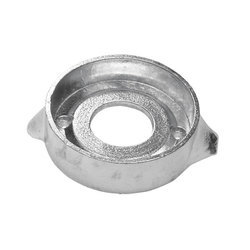This page has been translated with google translate, there may be errors in the stories.
You will find an anode on many parts of a ship, including the engine, hull of the ship and propeller. The anode that protects the valuable parts of the ship and should therefore be regularly checked for function and replaced if necessary. In most engine blocks, the cooling system has a zinc anode that is screwed into the block, but also propeller shafts and government documents have an anodes at the screw to protect them from sacrificing noble metal. Holes, craters and thick layers of oxide indicate that they have done their job with their sacrifice and they have protected precious metal ship parts. If an anode is eaten more than 50 percent, it should be replaced, but if the anodes are completely intact and clean, they have not worked. It may then be that the wrong anode is mounted or that the contact surfaces are not electrically conductive. You can check this with a multimeter.
Check anodes.
To check whether there is an electrical conduction, set the multimeter to Ohm / resistance. If you hold the measuring pins together, the meter will hardly deflect, no resistance. To measure the articulation of the anode, place 1 measuring pin on the anode and 1 on the ship attaching nuts (without paint), you may then barely measure resistance, but there is resistance and you must measure the contact surfaces with a brush or sandpaper.
Which type of anode.
Salt water = zinc anode
Fresh water = magnesium anode
Brackish water = aluminum anode

Engine anode
With the link you will find the different motor anodes that I sell through my site.

Ring anode for propeller shaft.
The link will take you to the different propeller shaft anodes that I sell through my site.

Sail drive anode.
The link will take you to the various saildrive anodes that I sell through my site.





